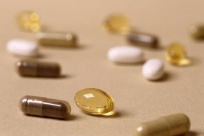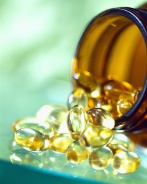|
ADHD Supplements : Brain Building Blocks
More and more recently, research is indicating the good possibility that children suffering from ADHD, bipolar and learning disabilities might also be lacking in necessary bodily nutrients. This is not to say they eat poorly, though for a variety of reasons, we know some might. But for causes unknown, sometimes their bodies don't naturally produce and/or store enough quantities of vitamins, minerals, and amino acids, thus causing deficiencies. Or in some cases, bodies don't process nutrients properly and the body stores an overabundance. This would most often be the case with toxic metals, lead, mercury, copper, etc. The addition of ADHD supplements is still considered an alternative treatment because it is not something commonly suggested by the doctors who medicate our children. For all these kids, and probably children in general, a HIGH quality multi-vitamin with minerals is a must. I say high quality because I'm not talking about your basic over the counter gummy bear vitamins. Though I have never tested this theory, if you ask your standard doctor, they would probably tell you these vitamins and minerals are fine. However, I know a naturopathic doctor who said he would never feed those things to his own kids, much less suggest them for his patients. Frankly, I think I like his answer. It makes sense to me that someone who's job it is to consider the whole body and whole person would have done his research. High quality vitamins, especially those recommended as ADHD supplements, tend to eliminate things kids don't need like sugar, gluten, dyes, and fillers, and by virtue of those exclusions they are hypo-allergenic. Meaning that if you have a child who seems very reactive or allergic to lots of things, this is good for you. Yes, you will likely pay more for these than those lovely gummy bears. But oh well! In his book (which is an extensive collaboration between traditional and alternative treatment), Dr. Daniel Amen cites a study where children between 12 and 13 were divided into three groups; no supplement, supplement, and placebo. The group that took the supplements showed a significant increase in nonverbal intelligence and there was no change at all for the other two groups. He also is a big believer in amino acids like L-tyrosine, L-tryptophan, and 5-HTP. These might be good examples of specific ADHD supplements. The first is an amino acid building block for dopamine. The next two are building blocks for serotonin. The thing is, these are present in everyone's body to some extent anyway and the chemicals they assist in your brain are the very same chemicals affected or impacted by traditional medications. If the side effects of medication worry you, find a doctor who is knowledgeable in alternative treatments. Side note - you might have to find a homeopathic or naturopathic doctor to accomplish this task. It is also possible to find products specifically formulated to address whatever specific symptoms or diagnosis you are treating. The benefit being you can focus on exactly what might be helpful. Also beneficial is the fact that natural remedies are not likely to be accompanied by unpleasant side effects the way traditional medication can be.
Omega-3 Fatty Acids Another vital ADHD supplement consideration are the omega-3 fatty acids. One of the more well known books about this is "The Omega-3 Connection: The Groundbreaking Antidepression Diet and Brain Program" by Andrew Stoll. Fatty acids make up the membranes of nerve cells. Without enough high levels, the membranes are less fluid. This can possibly cause them to react slowly or misfire altogether. You can obviously increase you dietary intake of omega-3 by eating more cold water fish like salmon and halibut. You can also work some flaxseed oil into your daily intake. Or you can take a supplement, which sometimes is easier for children.
The nutritionist we are working with has recommended Eskimo-3 oil As she explained it to me, the EPA is more for inflammation (of your general system) whereas the DHA is targeted more to neurological health. The two products she recommended for us have higher DHA than the OmegaBrite®. This is not to say Dr. Stoll's product isn't any good. His book does cite research to back up the success of his claims. And regardless, his book I think I am like most people in that I prefer to hear about success from people I know and trust who have tried different products and either found success or not. The world of alternative therapy and supplementation can be a pricey venture. I do not want anyone to waste their money. That said, for yet another perspective on the use of vitamins and minerals, please visit my friend
TJ Chambers' page on ADHD alternative treatment.
Get More Info on Focus ADHD for Children and Adults with ADHD
|


